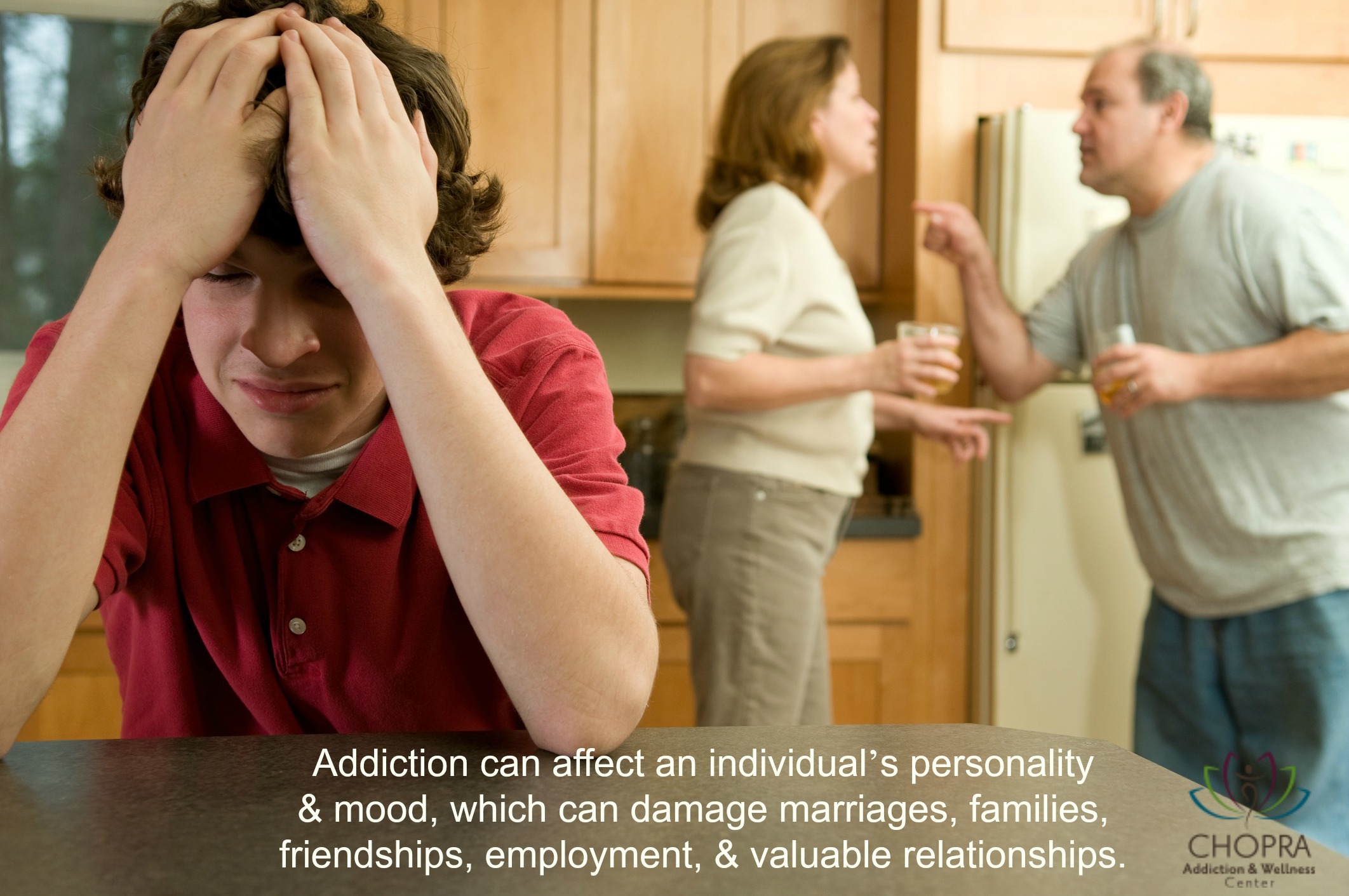The Social and Interpersonal Issues of Addiction

by Nirmala Raniga
Family and friends of those who struggle with drugs or alcohol know that addiction can be a debilitating condition that has far reaching effects, impacting everyone involved in a myriad of ways.
Addiction can, and very often does, affect an individual’s personality and mood, which can damage marriages, friendships, employment, and other valuable relationships. People who live or work with an addicted individual may often wonder how that person will behave on any given day, feel shame because of their erratic behavior, or worry that the individual’s substance abuse will threaten their safety and wellbeing. Longstanding fears such as this can then impact the way in which family members and friends interact with others beyond the circle of addiction. Children may not want to invite friends home if a parent is abusing alcohol, for instance, because they fear rejection from their peers once the truth of their home lives is revealed.
Beyond the home, children may struggle in school because they are worried about what is taking place within their families, which causes them to develop an inability to focus. If there is a great deal of fighting about the addicted individual’s behavior that keeps children awake at night, children may find it difficult to wake up on time and concentrate fully on their studies. Children of those with addiction issues sometimes do not even attend school on a regular basis due to negligence on the part of their caretakers. Furthermore, these children can often turn to substances themselves, in an effort to deal with the realities of their lives.
It can be difficult for those with addiction problems to find and secure employment due to the behavioral issues that substance abuse can cause. For example, they may be absent from or late for work, act out in inappropriate ways, miss deadlines, or perform in other ways that would cause them to be reprimanded or fired. Consequently, finances can be negatively affected, which can threaten the wellbeing of the individual and his or her dependents.
Life for the addicted person can spiral into even deeper darkness. When people are addicted to substances and find themselves in financial straits, they can often turn to illegal means to get the resources they need to fuel their addictions. Stealing cash, credit cards, or identities from those they purportedly love, are just some of the crimes that can be committed on family and friends by an addicted person who is facing financial difficulties. Addicts may also commit crimes in the broader community, perhaps shoplifting from stores, or turning to activities such as prostitution, in order to secure the money they need to purchase drugs or alcohol. Such crimes can lead to arrests and incarcerations, which in turn can cause financial and emotional hardships for victims and loved ones.
Long-term drug or alcohol abuse is also detrimental to the health of the addicted person. Sharing used needles; engaging in risky physical behavior; eating unhealthy food or not eating at all; smoking; sleep disruption; and other issues can lead to serious diseases or even early death. While alcohol poisoning and drug overdoses can have immediate and often fatal physical effects, other behaviors can cause long-term suffering as well. Diseases such as HIV and hepatitis are two illnesses that can result from sharing infected needles. Alcohol abuse can also lead to serious liver diseases. Smoking can cause kidney, lung, and many other forms of cancer, among other diseases. Families often bear the emotional and financial burdens of caring for those who become ill or incapacitated from drug or alcohol abuse. Communities may also shoulder the costs of caring for those who have no one to take care of them, which in turn shifts the financial costs to taxpayers.
Of course, those are just examples of what can happen to people with addiction problems who have let their health and wellbeing slip. The reality is that not everyone who is addicted to substance suffers from all of these consequences at once. But if we do find ourselves facing one or more of these challenges, we must understand that there are ways to reclaim our lives and heal.
It is important to recognize that individuals can make courageous leap to free themselves from drugs or alcohol. For continued success, it is critical for people to address the underlying issues. Physical pain, unresolved emotions and traumatic experiences can all be contributing factors that require healing and attention. It is also crucial to recognize the tremendous importance of developing detailed relapse prevention plans to successfully respond to challenging situations in the future. Individuals must have access to resources that best suit their needs. Patient safety is of the utmost importance, as is a supportive social network that includes family and friends.
Paradise Valley Healing Center is dedicated to assisting individuals in sustaining an addiction-free lifestyle through regular practices of mind-body-spirit wellness that will promote heath and balance. Learn more about the programs we offer.
